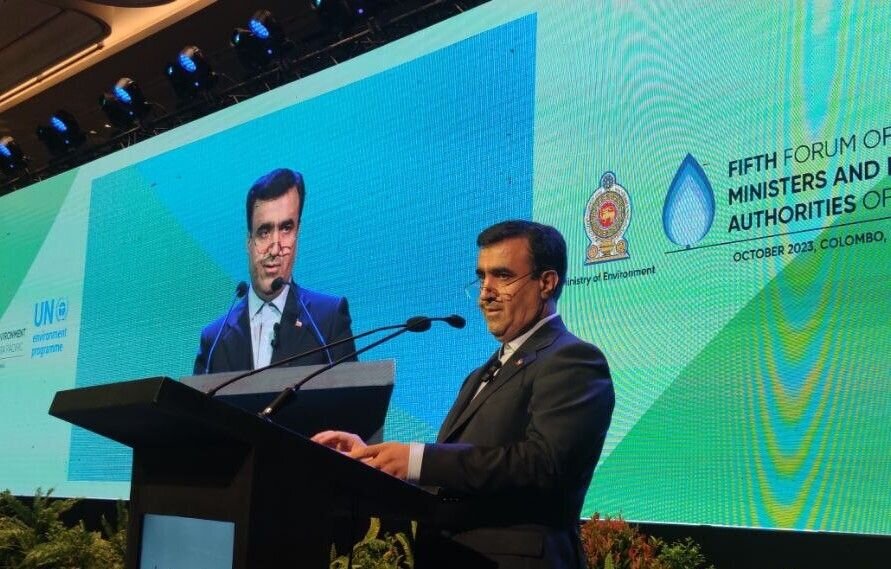Iran promotes global environmental diplomacy at AP Forum

TEHRAN - Ali Salajeqeh, head of the Department of Environment (DOE), has said global environmental diplomacy is one of the government's main programs.
He made the remarks at the "Fifth Forum of Ministers and Environment Authorities of Asia Pacific" on Thursday which was held from October 3-6 in Colombo, Sri Lanka.
“Environment precedes development” and “Global environmental diplomacy” are the government’s slogans, Salajeqeh said, IRIB reported.
He enumerated the national action plans for the preservation of biodiversity saying that Iran is home to many valuable genetic reserves in the world and has a rich biodiversity of important plant and animal species with over 2,200 endemic plant species and unique habitats, including the Zagros and Hyrcanian forests.
“Iran has made great strides in improving the marine ecosystem and biodiversity by developing an action plan for continuous monitoring of marine ecosystems, protecting and restoring vulnerable coastal habitats, adapting to the phenomenon of climate change in land and coastal areas, and dealing with plastic and micro-plastic pollution, IRIB quoted Salajeqeh as saying.
Talking about the impact of climate change on human life and the need to adapt to it, Salajeqeh said one of the consequences of climate change and extreme phenomena is the occurrence of floods, droughts, and sand and dust storms, the scope and intensity of which is expanding and is plaguing the countries of West Asia.
He also pointed to climate change as a serious menace to sustainable development in various aspects of the environment such as human health, food security, economic activities, natural resources, and infrastructure due to its impacts on agriculture, the environment, and public health.
Referring to the successful holding of a regional meeting of environment ministers in the past Iranian calendar year (ended on March 20), and the International Conference on Combating Sand and Dust Storms (SDSs) in Tehran, on September 9-10, he added that the declaration of the conference on SDSs can be the basis for joint cooperation between governments and international organizations for operational measures in the near future.
Salajeqeh talked about the establishment of community-based organizations under the title of "Environmental Houses".
The project that has been implemented aims to improve the level of environmental literacy and popularize environmental affairs.
Referring to the cruel sanctions against Iran, he pointed out that unilateral sanctions have reduced the country's ability to fulfill its responsibilities in national and international treaties.
In the end, he said, "With the cooperation of international organizations, regardless of political issues, using scientific and technological capacities and joint investment, we hope to be able to gift a healthy and clean future to our children.”
As per the Seventh National Development Plan (2023-2027), pollution control and environmental protection programs should be integrated with development projects.
According to the Constitution, environmental protection is considered a public duty.
Increasing environmental challenges have recently reached a crisis point.
Soil erosion, drought, dust, waste management, and air pollution, have not only been causing social, political, and security problems inside the country, but also threatening the future of Iran's relations with its neighbors.
Avoiding politicization
On October 8, 2021, Salajeqeh urged the world to avoid politicization of the environment, but to uphold the globally recognized “common but differentiated responsibilities”.
He made the remarks at the 4th Forum of Ministers and Environment Authorities of Asia Pacific, held virtually.
Pointing to the major environmental challenges, he said that “we need to synergize our efforts to achieve a better result to save the planet.”
“In the region, we are facing several environmental pressing issues and problems that are ever-increasing and exacerbating. Water scarcity is among the most important ones and many member states are trying hard to catch up with it.”
Expressing pleasure, he noted that “there is finally a global tendency to building back better and to formulate a balanced nature.
Also, it is good to see special attention to green recovery which will greatly help to achieve the sustainable development goals and various international instruments’ objectives to preserve and promote biodiversity and ecosystems.”
This noble objective would be achieved by creating green jobs, promoting sustainable consumption and production, and a healthy circular economy.
“To address these challenges, we have to avoid politicization of the environment and we need to uphold the globally recognized ‘Common but Differentiated Responsibilities’.”
Developed countries have to recognize their commitment to providing means of implementation such as financial assistance and transfer of technologies and the developing countries need to make the best use of their resources, he highlighted.
“Sustainable development now is at the center of the United Nations efforts; however, we need to bear in mind that development cannot be prescribed as a global solution to fit into the local or regional policies.
By the same token, we need to address the unilateral sanctions against some countries including mine, which is an important impediment to the financial contributions of those countries to maintain the pace of conservation of nature,” he further emphasized.
MT/ MG
